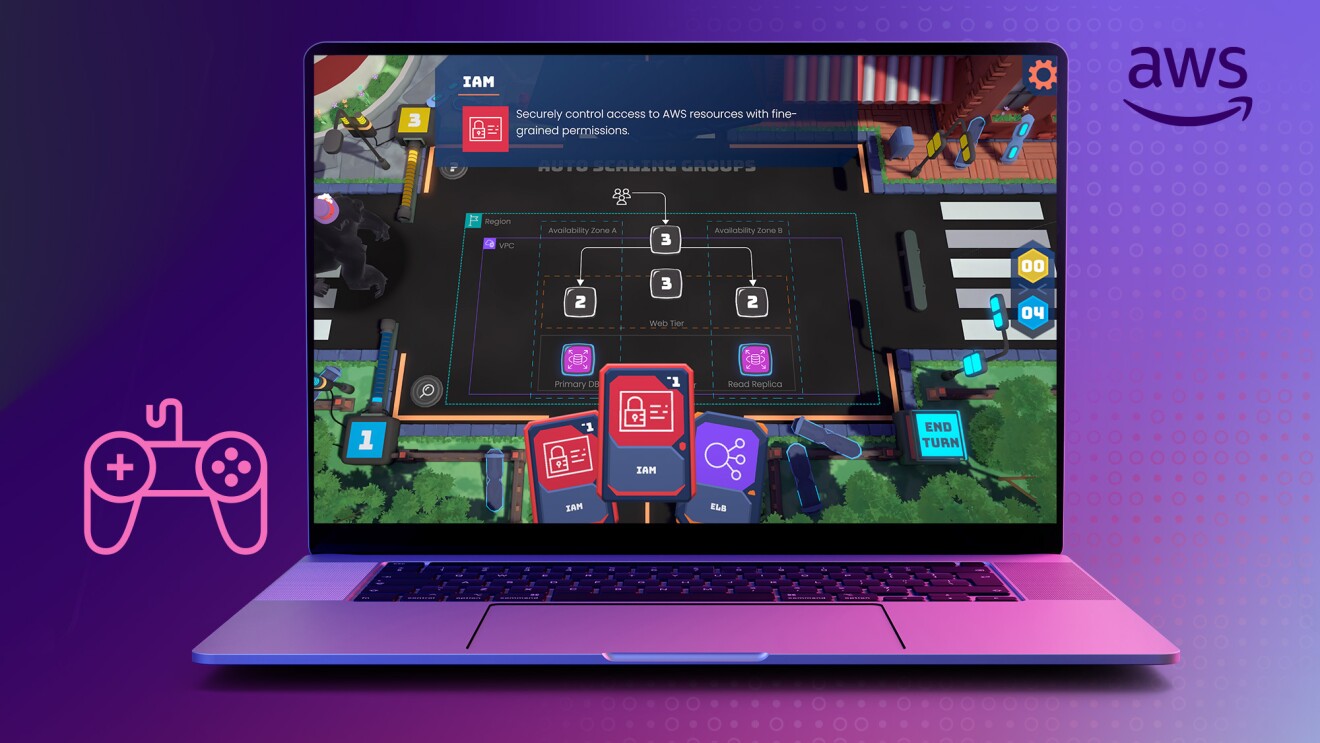There is a saying among South Africans that boils down to this: A farmer makes a plan.
"It's an expression everybody knows and kind of lives by," said James Greenfield, VP of software engineering at Amazon Web Services (AWS) in Cape Town, South Africa.
You will have noticed that Greenfield is not, by profession at least, a farmer. But for South Africans like him, it means that whatever it is you are doing, be it planting crops or inventing new ways to access computing, you just figure things out.
"Things will get in the way. You'll bump into something that doesn't work as well as it should," Greenfield said. "But then you just have to figure out how to make your own plan and make your own way."
That is exactly the approach that Greenfield and the small team that invented Amazon Elastic Compute Cloud (EC2) 15 years ago took when they were figuring out how to make practically infinite computing power available to anyone in the world.
They had an ethos, but what the fledgling AWS team in Cape Town needed next were some like-minded engineers to help.
Fortunately, South Africa had a solution for that too.
"He was working on this cool computing thing, the cloud."
It is hard to remember what things were like circa 2006. Cellphones could flip, but they weren't smart. Twitter had just launched, and the hashtag was being birthed. People assiduously minded their MySpace pages, and your evening's movie entertainment arrived on a disc in your mailbox. People knew Amazon solely as an ecommerce company that had just launched a service called Amazon Prime. In the spring of 2006, Amazon launched an internet storage service dubbed S3, but no one knew what the cloud was because it didn't really exist yet.
All of that was true in Cape Town. But if you were a South African technologist looking to work on something that would challenge your creativity, most of it was happening a world away—or, in true South African fashion, you were building it yourself.
Marc Brooker was working on his PhD in 2006 at the University of Cape Town, building what amounted to a compute-enabled simulation of radar systems that could do air traffic control for far cheaper. He was getting ready to graduate when he walked into his local bar, the Foresters Arms, for a beer.
"While standing at the bar, I was chatting to this guy who said he was from America and doing this cool computing thing—the cloud," Brooker said. "It was called EC2." Brooker didn't get the fellow's name (it was Peter DeSantis, now AWS' leader of Utility Computing Services, then fresh from Amazon HQ in Seattle), but he did get what the local team was trying to build. And Brooker was enthralled.
"We didn't have that much funding in our little lab at the university, and we had built this fully loaded computer simulation machine," Brooker said. "We thought this thing was a beast."
It was—in that it cost Brooker a lot of the funding he had left and took him six months to build.
"And these guys were telling me you can come to EC2, and with a credit card anybody can rent a server from us by the minute," Brooker said. "It was just immediately obvious to me how revolutionary that was going to be."
It stayed with him, and six months later Brooker interviewed and joined the local AWS Cape Town team. He's now a senior principal engineer at AWS in Seattle, focused on databases.
"The whole concept of being able to remotely access a machine was absolutely blowing my mind."
Those stories made the rounds, with one engineer telling another about this new "cloud computing" project underway at Amazon in Cape Town. Everyone knew each other, and if, like Brooker, they saw the potential in the project, they were drawn in by the challenge and the potential.
"At that time in South Africa, Cape Town had all these talented people in this kind of small place," said Gina Morris, who joined AWS in the early years of EC2. "I was walking through my demo at our career fair at University of Cape Town in my fourth year when I met some of the folks from the Amazon office. The whole concept of being able to remotely access a machine was absolutely blowing my mind."
Morris recalled going through her initial phone interviews from her parents' smallholding outside of Johannesburg. "It is the middle of nowhere, and we were doing coding questions. And I had to go outside far from the house where I could get a signal on some mobile WiFi dongle; the wireless internet back then wasn't anything like it is today," Morris said. "It was an interesting interview experience. I was kind of holding a phone, trying to get a connection for my laptop, and code at the same time. It seemed to go OK. I got hired in the end."
Not long after, Morris was set to start her new gig but was told to push back her arrival at the Cape Town office a few days.
"There was nothing for me to work on," she said. The ship carrying my computer was somewhere out there on the ocean still."
Cape Town is 10 hours ahead of the Pacific Time Zone, 10,200 miles from Seattle by plane, and—certainly in the case of Morris's laptop—a long way by boat. For the Cape Town team, that distance was an advantage. Morris, who also lives in Seattle now and is still a part of the EC2 team, describes it as a welcome isolation. When the team in Cape Town was heading to work, others were heading to bed.
"Being so far from Seattle both allowed us and forced us to approach things in the most revolutionary way possible."
"We didn't have a whole bunch of emails through the day," Morris said. "We didn't have a bunch of people trying to kind of keep track, and so we had this buffer between what we were doing and what everyone else was doing."
That presents a choice.
"You can either sit and wait 24 hours to get an answer, to move a step ahead, or you can just figure out a way forward," Morris said. "That was what drove it: you figure out a way forward."
A farmer makes a plan.
"I think that distance allowed us to not really think about our place in the world and instead just really think big about how we were not only going to invent this cloud thing, but how we could reinvent the notion of provisioning data centers completely," Brooker said. "Being separate, being so far from Seattle, both allowed us and forced us to approach things in the most revolutionary way possible, I guess, rather than trying to build on top of something that had existed."
So what did they build in those early years in Cape Town?
Fundamentally, EC2 is like having a computer with which you can do a whole variety of things, but it doesn't have to be one machine. It can be literally whatever computing muscle is required—small or very, very big.
"The really beneficial thing is you don't have to go and buy a second computer or a 200th one. You don't need to upgrade to newer, better hardware. It's there already, and you just use it when you need it," Morris said. "That was the initial breakthrough that came out of Cape Town: anything that you could do with a massive data center, you can now do with practically the click of a button with EC2. So if you want hundreds of thousands of machines, you can, and with all the security protocols to keep everything safe."
"Elves on roller skates."
Greenfield, when explaining EC2 to non-technical folks in the earliest years, used a more fanciful description of what he was working on.
"My analogy was elves on roller skates in a big data center, and they're getting little telegrams saying, 'I need a machine,' and so they're skating over to a machine, plugging in a hard drive, and booting it up," Greenfield said. "So, that was the way that I described it, except when I told people I was packing books for Amazon–that was something they had heard of at least."
Greenfield is still amazed and proud of what the Cape Town team built. The team went from pondering who might use EC2 in the earliest years of the service to witnessing EC2 eclipse 1 million compute instances in 2009, 2 million instances four months later, and 3 million instances two months after that. It was about then that the team stopped counting.
And while the adoption of EC2—and cloud services broadly— has changed how, and ultimately who, can access the most powerful compute on the planet, it's the innovation it makes possible that constantly inspires Greenfield.
"Seeing how EC2, and what we do across AWS, frees people up to go and try things, aligns very, very directly with the things that personally motivate me," Greenfield said. "I guess I am just lazy and it annoys me when I see people having to do stuff software could do for them."
Greenfield and the team in Cape Town have been witnessing the freedom the cloud offers people across the globe for the last 15 years, and their ability to invent because of that freedom is only accelerating.
"I am confident that we have so many more interesting things out there that people have been playing with, and they range from frivolous to the deeply meaningful—whether that is someone trying to use machine learning to keep their cat from dragging dead animals in the house or discovering the next therapeutics for COVID-19," Greenfield said. "They're the things that people may not have even been able to try to build in the past. But now, why not? Why not give it a go? I think that's incredibly powerful."
Trending news and stories








